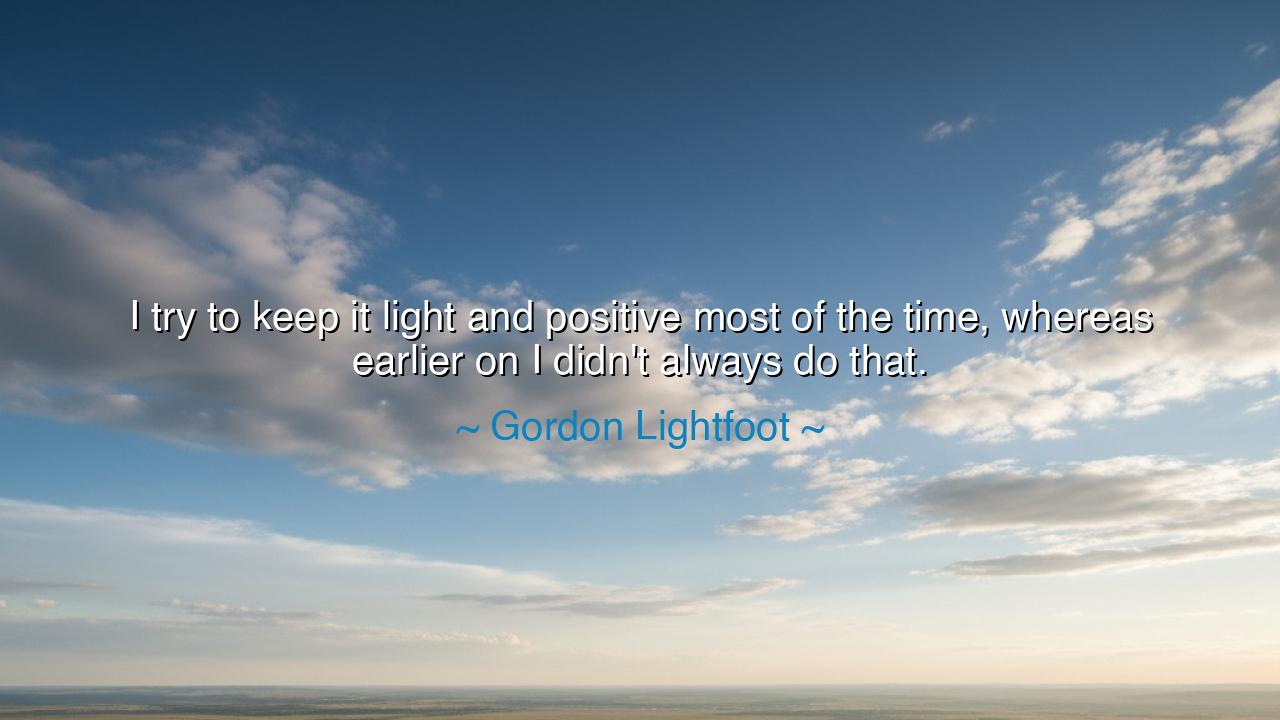
I try to keep it light and positive most of the time, whereas
I try to keep it light and positive most of the time, whereas earlier on I didn't always do that.






Hear the voice of Gordon Lightfoot, poet of song and chronicler of the human heart, who confessed with gentle honesty: “I try to keep it light and positive most of the time, whereas earlier on I didn’t always do that.” These words, simple in form, carry the weight of a lifetime of creation, sorrow, and wisdom. For in them is the story of a man who learned that the world has enough heaviness, and that to bring joy, even in small measure, is itself an act of healing.
The origin of this saying lies in Lightfoot’s long career as a musician. His earlier works often carried tones of melancholy—songs of longing, loss, and the relentless passage of time. Yet as he grew older, he sought a different path. He discovered that while sorrow binds us together, it is hope that lifts us, it is positivity that allows the weary to endure. His words reveal the artist’s transformation: from one who bore the weight of shadows to one who chose to shine light for others to follow.
History offers us examples of this same evolution. Consider the later years of the Roman philosopher Seneca, who in his early writings dwelt heavily on the inevitability of death and the cruelty of fate. Yet in his letters of old age, he softened, urging his friend Lucilius to embrace serenity, to live with gratitude, and to seek peace rather than despair. Like Lightfoot, he moved from heaviness to lightness, from relentless focus on the burdens of life to the gentler wisdom of hope.
The deeper meaning of Lightfoot’s words is that tone shapes destiny. To dwell always in darkness is to become heavy in spirit, to spread gloom to others. But to turn deliberately toward lightness—to choose laughter, kindness, and gentleness—is to give a gift that multiplies. This does not deny the reality of sorrow, but it balances it. It is as though Lightfoot learned that music, and life itself, must not only name our wounds but also sing us toward healing.
The lesson is clear: we must be mindful of the energy we bring into the world. Every word, every action, every song carries weight. If we fill them with heaviness, we may deepen despair; but if we fill them with positivity, we may spark hope where it seemed extinguished. The choice is ours—to be carriers of shadows or of light.
To the youth, I say: you may not control the sorrows of life, but you can control whether you meet them with bitterness or with humor. To the weary, I say: even in the darkest seasons, you can offer others a smile, a kind word, or a song that helps them carry their burden. To the artists, I say: your craft is not only for expression, but also for consolation—remember the power of lightness to heal.
Practical action lies before us: begin each day by asking, “What light can I bring today?” Speak words that encourage rather than wound. Seek humor, even when life feels heavy, for laughter is a balm to the spirit. And when sorrow must be faced, do not let it consume you; let it be tempered by gratitude and by the courage to keep moving forward.
Thus Gordon Lightfoot’s words endure: “I try to keep it light and positive most of the time.” They are not only the reflection of a songwriter’s journey, but a timeless truth for all of us. Let us then carry this teaching: acknowledge sorrow, but choose hope; honor the shadows, but shine light. For in doing so, we become not only survivors of life’s storms, but also beacons for others who must still walk through them.






TTNguyen thanh thuy
It’s nice to hear Gordon Lightfoot’s reflection on growth and positivity. It makes me think—why is it that, as we age, we might naturally gravitate toward a more positive outlook? Is it experience that teaches us to focus on the brighter side of things, or do we consciously choose to do so in order to feel more at peace with ourselves and others?
TNthu ngan
I love how this quote shows a shift in mindset. It's great that Gordon Lightfoot found a way to keep things lighter and more positive, but I wonder if that’s always possible in the face of real hardships. When life throws challenges your way, how do you keep a positive outlook? Is it about perspective or simply about learning to cope with difficulties more effectively?
MTNhan Ma Thien
It’s so refreshing to hear someone like Gordon Lightfoot talk about keeping things light and positive. It seems like many of us, when younger, might struggle with pessimism or negativity, and it’s often in later years that we seek to focus on the good. Is this a shift we all experience as we get older, or is it something we need to consciously work toward in our personal growth?
PTNguyen Cong Phuong Thuy
This quote resonates with me because it’s a reminder that people can change and grow, especially when it comes to attitude. I’ve noticed myself becoming more positive over the years, but I wonder if it’s a result of maturity or simply learning how to navigate difficult situations better. Does it get easier with time, or is it a conscious choice every day to stay light and positive?
TYNguyen Thi Yen
I really appreciate this perspective from Gordon Lightfoot. It’s interesting how people evolve over time and become more conscious of the energy they bring to the world. I wonder, though, is it always possible to stay positive, especially when life gets tough? Or does this shift come with age or experience? What do you think is the key to maintaining a positive mindset even through challenges?